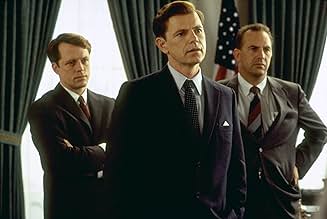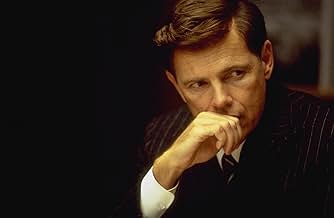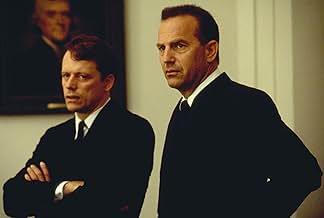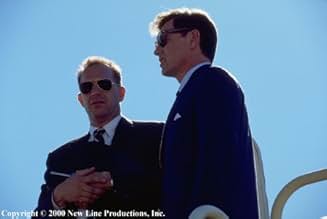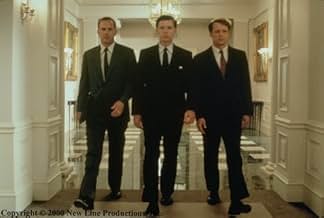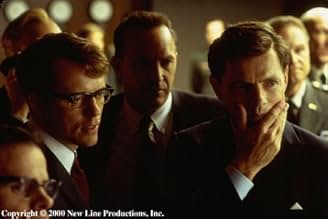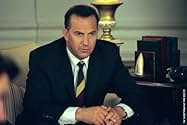In October 1962, the Kennedy administration struggles to contain the Cuban Missile Crisis.In October 1962, the Kennedy administration struggles to contain the Cuban Missile Crisis.In October 1962, the Kennedy administration struggles to contain the Cuban Missile Crisis.
- Director
- Writers
- Stars
- Awards
- 3 wins & 8 nominations total
- Director
- Writers
- All cast & crew
- Production, box office & more at IMDbPro
7.366K
1
2
3
4
5
6
7
8
9
10
Featured reviews
Very well done.
Poor Kevin Costner. I get the feeling that he just can't win no matter what he does. He gets slammed for being in films and not using an appropriate accent. Need we look any further than 'Robin Hood: Prince of Thieves'? When he does use an accurate accent, as he does in 'Thirteen Days,' he gets slammed for trying to elevate his game to a playing field dominated by more well liked method actors. I've heard an argument before that he should just stick to making westerns since, allegedly, they're the only films that he does well. Many would immediately argue that 'Wyatt Earp' cancels out 'Dances With Wolves.' I argue instead that people are just too hard on Kevin Costner and 'Thirteen Days' is a very good example of why he deserves a bit of a break.
'Thirteen Days' was the fastest two and a half hours that I've sat through in a long time. The film was absolutely engrossing and very tense. Everyone knows what happens (or should be able to infer it since we'd all be dead right now if things hadn't worked out so well) but the writing and direction deserve great credit. They were able to transfer the tension from the historical situation and bring it to the screen with electricity. I think it works brilliantly well for two main reasons: 1. The viewer may know what is going to happen, but the characters don't. They are stressed, terrified and at the breaking point. One wrong move and the whole world is obliterated. If that isn't good drama, I don't know what is. 2. The film makers very wisely resisted the impulse to try and show things from the Soviet point of view. The strength of the film is the peril of the situation and the terror of not knowing what the other guy is trying to do. By filming from solely an American perspective and keeping both the characters and audience in the dark, this character driven movie excels.
A second brilliant strategy employed by the film makers was in the casting. With the exception of Costner, there are no real stars. Instead there are more reliable, hard-working and chameleon-like character actors. Len Cariou, Dylan Baker, Stephen Culp, and Bruce Greenwood are just a small sampling. Greenwood plays JFK and excellently plays a man desperate for peace but surrounded by calls for swift military action. He sees the bigger picture where others don't, but may not be able to navigate the smaller picture without help. Dylan Baker is a doppelganger and his performance as McNamara is spot on.
Highly recommended.
'Thirteen Days' was the fastest two and a half hours that I've sat through in a long time. The film was absolutely engrossing and very tense. Everyone knows what happens (or should be able to infer it since we'd all be dead right now if things hadn't worked out so well) but the writing and direction deserve great credit. They were able to transfer the tension from the historical situation and bring it to the screen with electricity. I think it works brilliantly well for two main reasons: 1. The viewer may know what is going to happen, but the characters don't. They are stressed, terrified and at the breaking point. One wrong move and the whole world is obliterated. If that isn't good drama, I don't know what is. 2. The film makers very wisely resisted the impulse to try and show things from the Soviet point of view. The strength of the film is the peril of the situation and the terror of not knowing what the other guy is trying to do. By filming from solely an American perspective and keeping both the characters and audience in the dark, this character driven movie excels.
A second brilliant strategy employed by the film makers was in the casting. With the exception of Costner, there are no real stars. Instead there are more reliable, hard-working and chameleon-like character actors. Len Cariou, Dylan Baker, Stephen Culp, and Bruce Greenwood are just a small sampling. Greenwood plays JFK and excellently plays a man desperate for peace but surrounded by calls for swift military action. He sees the bigger picture where others don't, but may not be able to navigate the smaller picture without help. Dylan Baker is a doppelganger and his performance as McNamara is spot on.
Highly recommended.
Gripping but simplistic account
I'm showing the film now to my history seniors so felt obliged to comment on it. Whilst the film is undeniably gripping as a political thriller, it takes considerable liberties with historical facts, thereby compromising its value as an educational resource on this critical period in Cold War history.
One of the most glaring inaccuracies in the film is the exaggerated role of Kenneth O'Donnell, played by Kevin Costner. O'Donnell, who was a special assistant to President Kennedy, is portrayed as an influential figure in the crisis, often present in high-level meetings and even influencing the President's decisions. In reality, O'Donnell was not a key player in the crisis management and was largely uninvolved in the ExComm meetings, which were attended by experts in foreign policy and military strategy. The film's focus on O'Donnell seems to be a deliberate attempt to create a relatable character for the audience, but it distorts the historical record and minimises the roles of pivotal figures like Secretary of Defence Robert McNamara and Secretary of State Dean Rusk.
Another point of contention is the film's portrayal of President Kennedy, played by Bruce Greenwood. While the film does capture Kennedy's calm and rational demeanor, it fails to delve into the complexities of his decision-making process. The President is shown as almost unilaterally steering the United States away from military action, whereas, in reality, he was under immense pressure from his military advisors to authorize an airstrike against Soviet missile sites in Cuba. The film simplifies the intricate discussions and debates that took place among the ExComm members, reducing them to a binary choice between war and peace.
Furthermore, the Soviet perspective is conspicuously absent from the narrative. The film does not delve into the motivations of Soviet Premier Nikita Khrushchev or explore the geopolitical considerations that led the Soviet Union to place missiles in Cuba. This omission perpetuates a one-sided view of the crisis and fails to provide a nuanced understanding of the complex interplay of factors that averted a nuclear catastrophe.
The film also glosses over the role of backchannel communications between the United States and the Soviet Union, which were crucial in resolving the crisis. The secret correspondence between Attorney General Robert Kennedy and Soviet Ambassador Anatoly Dobrynin played a significant role in reaching a peaceful resolution, yet this is scarcely mentioned in the film.
So whilst "Thirteen Days" succeeds as a suspenseful dramatisation of a critical moment in history, it falls short as an accurate representation of the events it depicts. The film takes liberties with historical facts, exaggerates the roles of certain individuals, and omits key aspects of the crisis, thereby providing a skewed understanding of the Cuban Missile Crisis. As such, it should be viewed as a piece of historical fiction rather than a reliable educational resource.
My site- Tracesofevil com.
One of the most glaring inaccuracies in the film is the exaggerated role of Kenneth O'Donnell, played by Kevin Costner. O'Donnell, who was a special assistant to President Kennedy, is portrayed as an influential figure in the crisis, often present in high-level meetings and even influencing the President's decisions. In reality, O'Donnell was not a key player in the crisis management and was largely uninvolved in the ExComm meetings, which were attended by experts in foreign policy and military strategy. The film's focus on O'Donnell seems to be a deliberate attempt to create a relatable character for the audience, but it distorts the historical record and minimises the roles of pivotal figures like Secretary of Defence Robert McNamara and Secretary of State Dean Rusk.
Another point of contention is the film's portrayal of President Kennedy, played by Bruce Greenwood. While the film does capture Kennedy's calm and rational demeanor, it fails to delve into the complexities of his decision-making process. The President is shown as almost unilaterally steering the United States away from military action, whereas, in reality, he was under immense pressure from his military advisors to authorize an airstrike against Soviet missile sites in Cuba. The film simplifies the intricate discussions and debates that took place among the ExComm members, reducing them to a binary choice between war and peace.
Furthermore, the Soviet perspective is conspicuously absent from the narrative. The film does not delve into the motivations of Soviet Premier Nikita Khrushchev or explore the geopolitical considerations that led the Soviet Union to place missiles in Cuba. This omission perpetuates a one-sided view of the crisis and fails to provide a nuanced understanding of the complex interplay of factors that averted a nuclear catastrophe.
The film also glosses over the role of backchannel communications between the United States and the Soviet Union, which were crucial in resolving the crisis. The secret correspondence between Attorney General Robert Kennedy and Soviet Ambassador Anatoly Dobrynin played a significant role in reaching a peaceful resolution, yet this is scarcely mentioned in the film.
So whilst "Thirteen Days" succeeds as a suspenseful dramatisation of a critical moment in history, it falls short as an accurate representation of the events it depicts. The film takes liberties with historical facts, exaggerates the roles of certain individuals, and omits key aspects of the crisis, thereby providing a skewed understanding of the Cuban Missile Crisis. As such, it should be viewed as a piece of historical fiction rather than a reliable educational resource.
My site- Tracesofevil com.
Almost the end of civilization as we know it.
I watched this movie today with a number of students from my International Politics class, and from the standpoint of a politics professor, this film was absolutely extraordinary. This is a movie about the development of foreign policy in a crisis; it spells out with brilliant detail the decision-making process of JFK's inner circle, the tension between the Executive Office of the President and the Departments of State and Defense, and the attempts by the Military Industrial Complex (namely the Joint Chiefs) to undermine the diplomatic approaches favored by the president. It highlights the conflict between military standard operating procedures ("rules of engagement") and the better judgment/common sense of right-thinking human beings. It hints at conspiracies to (later) depose and otherwise get rid of both Kennedy and Khruschev from within for what turned out to be a very unpopular resolution with the hardliners on both sides. I especially like that the movie acknowledged the humanity of the individual decision-makers without getting too Capra-esquire or preachy.
I can see why this film hasn't been a great commercial success. It is not your standard big studio fare. It's quite cerebral, and although it has some exciting pre-conflict scenes, it's not a "war film". (It reminds me a bit of "Three Kings" in that regard- both films were, in my opinion, mis-marketed. They both seemed to target the younger male action crowd, when both movies are really made for a more intellectual audience.) I liked how the Soviets were not cartoonishly vilified, as is common in a lot of Cold War era films. They were shown to be somewhat calculating and strategic, but not irrational or more importantly, inhuman. In fact, one of the most fascinating parts of the film is the revelation that both sides lack information as to the other side's true intentions. It was this uncertainty that back in October 1962, could have led to the end of civilization as we know it.
The acting was solid (Steven Culp was very, very good as Robert Kennedy- so good, in fact, that I'm afraid he'll have a hard time getting cast in the future. There was audible gasp in the audience when he came on the screen and WAS Bobby). Coaster's accent was actually annoying (as an earlier reviewer noted), but it's forgivable in light of the moving, somewhat understated performance he turns in. It is the directing that takes the cake, however. From the moment the chain of events was set in motion, the tension does NOT let up. It actually feels like you are back in 1962 living through the events of those two weeks- honestly, there was nary a moment to relax until the resolution was wrought. I recommend this film especially strongly to high school and college age students who are too young to have any Cold War memory, as well as to those who lived through the era and may have forgotten what it felt like to come this close.
I can see why this film hasn't been a great commercial success. It is not your standard big studio fare. It's quite cerebral, and although it has some exciting pre-conflict scenes, it's not a "war film". (It reminds me a bit of "Three Kings" in that regard- both films were, in my opinion, mis-marketed. They both seemed to target the younger male action crowd, when both movies are really made for a more intellectual audience.) I liked how the Soviets were not cartoonishly vilified, as is common in a lot of Cold War era films. They were shown to be somewhat calculating and strategic, but not irrational or more importantly, inhuman. In fact, one of the most fascinating parts of the film is the revelation that both sides lack information as to the other side's true intentions. It was this uncertainty that back in October 1962, could have led to the end of civilization as we know it.
The acting was solid (Steven Culp was very, very good as Robert Kennedy- so good, in fact, that I'm afraid he'll have a hard time getting cast in the future. There was audible gasp in the audience when he came on the screen and WAS Bobby). Coaster's accent was actually annoying (as an earlier reviewer noted), but it's forgivable in light of the moving, somewhat understated performance he turns in. It is the directing that takes the cake, however. From the moment the chain of events was set in motion, the tension does NOT let up. It actually feels like you are back in 1962 living through the events of those two weeks- honestly, there was nary a moment to relax until the resolution was wrought. I recommend this film especially strongly to high school and college age students who are too young to have any Cold War memory, as well as to those who lived through the era and may have forgotten what it felt like to come this close.
Thirteen Days was a wonderfully acted, wonderfully told story about the 13 days of the Cuban Missile Crisis, a time when the world almost came to an end.
Shown through the eyes of presidential aide Kenneth P. O'Donnell (Kevin Costner), we see the inner workings of President John F. Kennedy (Bruce Greenwood) and his closest advisors as they try and find the best way to end a potentially devastating showdown with the U.S.S.R. In October of 1962, the U.S., during a regular mission photographing Cuba, spotted a missile buildup by the Russians. The missiles were powerful enough to kill 80 million Americans with only 5 minutes of warning time. President Kennedy had to decide quickly what action to take. With his trusted aide Kenny O'Donnell and his brother Attorney General Robert F. Kennedy (Steven Culp), and others such as Robert McNamara, Adlai Stevenson, McGeorge Bundy, Dean Acheson, Dean Rusk, and many more, Kennedy needed to figure out the best course of action. If he allowed the Russians to aim these missiles at the U.S., the United States would be placed in a potentially deadly situation. If Kennedy allowed the military to attack the missiles and destroy them, what would Russia do as a response? If he waited too long, would Russia simply attack the U.S.? If he backed down and agreed to take down U.S. missiles in Turkey, would the U.S. then look weak to the rest of the world? For such a young President, Kennedy had a lot of tough decisions to make, in a short amount of time, with the world hanging in the balance.
I wasn't alive during the Cuban Missile Crisis as it occurred, so seeing Thirteen Days was like having a history lesson at the same time as having great entertainment. Even though I knew that we didn't end up in World War III, there were a lot of things I didn't know. I won't go into any of the specifics, but I never fully understood how close we came to destroying the planet. The tensions of the time were brought out successfully by director Roger Donaldson. You could see and feel the sweat on all the major players as each minute ticked by. Bruce Greenwood did a tremendous job as the young President Kennedy, showing how Kennedy was strong enough to stand by his morals and values, even as his most trusted advisors were urging him to go to war. At the same time, Greenwood was able to portray Kennedy as someone who needed help and was able to turn to his brother for guidance. Kevin Costner did a good job as Kennedy's presidential aide. I especially liked his boston accent. Costner was a strong personality that worked well with Greenwood and Steven Culp. I believed that the three of them were friends for 15 years and that they trusted each other with their own lives. Other acting standouts to me were Dylan Baker as Robert McNamara and Michael Fairman as Adlai Stevenson.
Even running at almost two and a half hours, I was always at the edge of my seat, wondering what was going to happen next. Like I said before, I wasn't even born yet, nor was it something I ever learned about in school, so I had no idea what was going to happen. It was nice being able to get deep inside the mind of these important people during this crucial time. Of course, I have no idea if what was said during these meetings was actually said in real life, but I'd like to believe that at least the outcomes of the meetings were true. I'm a big fan of these kinds of dramatic films based on real life events. While being entertaining, they also have the ability to teach you about history. Reading about these situations in books isn't nearly as enjoyable as being able to watch them on screen. I think screenwriter David Self did a great job of bringing these real life events to life on the big screen. He made it historical but didn't bore you with too much talk or information. Along with Donaldson, he gave you what you needed to know, and let the actors bring you into the action.
So overall, I thought Thirteen Days was a great film. Well acted, well directed, well written, nice musical score and very entertaining throughout. And if you happen to learn something along the way like I did, then even better.
I wasn't alive during the Cuban Missile Crisis as it occurred, so seeing Thirteen Days was like having a history lesson at the same time as having great entertainment. Even though I knew that we didn't end up in World War III, there were a lot of things I didn't know. I won't go into any of the specifics, but I never fully understood how close we came to destroying the planet. The tensions of the time were brought out successfully by director Roger Donaldson. You could see and feel the sweat on all the major players as each minute ticked by. Bruce Greenwood did a tremendous job as the young President Kennedy, showing how Kennedy was strong enough to stand by his morals and values, even as his most trusted advisors were urging him to go to war. At the same time, Greenwood was able to portray Kennedy as someone who needed help and was able to turn to his brother for guidance. Kevin Costner did a good job as Kennedy's presidential aide. I especially liked his boston accent. Costner was a strong personality that worked well with Greenwood and Steven Culp. I believed that the three of them were friends for 15 years and that they trusted each other with their own lives. Other acting standouts to me were Dylan Baker as Robert McNamara and Michael Fairman as Adlai Stevenson.
Even running at almost two and a half hours, I was always at the edge of my seat, wondering what was going to happen next. Like I said before, I wasn't even born yet, nor was it something I ever learned about in school, so I had no idea what was going to happen. It was nice being able to get deep inside the mind of these important people during this crucial time. Of course, I have no idea if what was said during these meetings was actually said in real life, but I'd like to believe that at least the outcomes of the meetings were true. I'm a big fan of these kinds of dramatic films based on real life events. While being entertaining, they also have the ability to teach you about history. Reading about these situations in books isn't nearly as enjoyable as being able to watch them on screen. I think screenwriter David Self did a great job of bringing these real life events to life on the big screen. He made it historical but didn't bore you with too much talk or information. Along with Donaldson, he gave you what you needed to know, and let the actors bring you into the action.
So overall, I thought Thirteen Days was a great film. Well acted, well directed, well written, nice musical score and very entertaining throughout. And if you happen to learn something along the way like I did, then even better.
Historic movie about Cuban Missile Crisis with intrigue , tension and good performances
The 1962 Cuban Missile Crisis seen through the eyes of President assistant Kenny O'Donnell (Kevin Costner who hands perfectly the role )as trusted confidante and with significance importance of Robert Kennedy ( Steven Culp who bears remarkable resemblance )and of course President John F . Kennedy ( a solid Bruce Greenwood ) . This interesting film widely develops the Cuban Missile Crisis that was a confrontation between the Soviet Union, Cuba and the United States in October 1962, during the Cold War. The picture is packed with suspense , drama , historical deeds and is quite entertaining . It's correctly based on facts and the few sacrifices of accuracy are realized in the sense of of dramatic license . The motion picture is very well directed by Roger Donaldson who formerly worked with Costner in another suspenseful movie and also plenty of political intrigue titled ¨No way out (87) ¨ .
Adding more details over the widely depicted on the movie the events happened of the following manner : In September 1962, the Cuban and Soviet governments began to surreptitiously build bases in Cuba for a number of medium- and intermediate-range ballistic nuclear missiles (MRBMs and IRBMs) with the ability to strike most of the continental United States. This action was subsequent to the 1958 deployment of Thor IRBMs in the UK and Jupiter IRBMs to Italy and Turkey in 1961; more than 100 U.S.-built missiles having the capability to strike Moscow with nuclear warheads. On October 14, 1962, a United States U-2 photo-reconnaissance plane captured photographic proof of Soviet missile bases under construction in Cuba.The ensuing crisis ranks with the Berlin Blockade as one of the major confrontations of the Cold War and is generally regarded as the moment in which the Cold War came closest to turning into a nuclear conflict .The US President ( Bruce Greenwood) , Attorney General Robert Kennedy (Steven Culp ),State Secretary Robert McNamara ( Dylan Baker ) and his military staff ( Bill Smitrovich , Ed Lauter , James Karen , Len Cariou) and general Curtis LeMay (Kevin Conway ) considered attacking Cuba via air and sea and settled on a "quarantine" of Cuba. The U.S. announced that it would not permit offensive weapons to be delivered to Cuba and demanded that the Soviets dismantle the missile bases already under construction or completed in Cuba and remove all offensive weapons. The Kennedy administration held a slim hope that the Kremlin would agree to their demands, and expected a military confrontation. On the Soviet end, Nikita Khrushchev wrote Kennedy that his quarantine of "navigation in international waters and air space to constitute an act of aggression propelling humankind into the abyss of a world nuclear-missile war." Fidel Castro encouraged Khrushchev to launch a preemptive first-strike nuclear attack on the U.S. The Soviets publicly balked at the U.S. demands, but in secret back-channel communications initiated a proposal to resolve the crisis. The confrontation ended on October 28, 1962 when President John F. Kennedy and United Nations Secretary-General U Thant reached an agreement with Soviet Premier Nikita Khrushchev to dismantle the offensive weapons and return them to the Soviet Union, subject to United Nations verification, in exchange for an agreement by the United States to never invade Cuba. The Soviets removed the missile systems and their support equipment, loading them onto eight Soviet ships from November 5–9. A month later, on December 5 and 6, the Soviet IL-28 bombers were loaded onto three Soviet ships and shipped back to Russia. The quarantine was formally ended previously on November 20, 1962. As a secret part of the agreement, all US-built Thor and Jupiter IRBMs deployed in Europe were deactivated by September 1963.The Cuban Missile Crisis spurred the creation of the Hotline Agreement and the Moscow-Washington hot line, a direct communications link between Moscow and Washington .
Adding more details over the widely depicted on the movie the events happened of the following manner : In September 1962, the Cuban and Soviet governments began to surreptitiously build bases in Cuba for a number of medium- and intermediate-range ballistic nuclear missiles (MRBMs and IRBMs) with the ability to strike most of the continental United States. This action was subsequent to the 1958 deployment of Thor IRBMs in the UK and Jupiter IRBMs to Italy and Turkey in 1961; more than 100 U.S.-built missiles having the capability to strike Moscow with nuclear warheads. On October 14, 1962, a United States U-2 photo-reconnaissance plane captured photographic proof of Soviet missile bases under construction in Cuba.The ensuing crisis ranks with the Berlin Blockade as one of the major confrontations of the Cold War and is generally regarded as the moment in which the Cold War came closest to turning into a nuclear conflict .The US President ( Bruce Greenwood) , Attorney General Robert Kennedy (Steven Culp ),State Secretary Robert McNamara ( Dylan Baker ) and his military staff ( Bill Smitrovich , Ed Lauter , James Karen , Len Cariou) and general Curtis LeMay (Kevin Conway ) considered attacking Cuba via air and sea and settled on a "quarantine" of Cuba. The U.S. announced that it would not permit offensive weapons to be delivered to Cuba and demanded that the Soviets dismantle the missile bases already under construction or completed in Cuba and remove all offensive weapons. The Kennedy administration held a slim hope that the Kremlin would agree to their demands, and expected a military confrontation. On the Soviet end, Nikita Khrushchev wrote Kennedy that his quarantine of "navigation in international waters and air space to constitute an act of aggression propelling humankind into the abyss of a world nuclear-missile war." Fidel Castro encouraged Khrushchev to launch a preemptive first-strike nuclear attack on the U.S. The Soviets publicly balked at the U.S. demands, but in secret back-channel communications initiated a proposal to resolve the crisis. The confrontation ended on October 28, 1962 when President John F. Kennedy and United Nations Secretary-General U Thant reached an agreement with Soviet Premier Nikita Khrushchev to dismantle the offensive weapons and return them to the Soviet Union, subject to United Nations verification, in exchange for an agreement by the United States to never invade Cuba. The Soviets removed the missile systems and their support equipment, loading them onto eight Soviet ships from November 5–9. A month later, on December 5 and 6, the Soviet IL-28 bombers were loaded onto three Soviet ships and shipped back to Russia. The quarantine was formally ended previously on November 20, 1962. As a secret part of the agreement, all US-built Thor and Jupiter IRBMs deployed in Europe were deactivated by September 1963.The Cuban Missile Crisis spurred the creation of the Hotline Agreement and the Moscow-Washington hot line, a direct communications link between Moscow and Washington .
Did you know
- TriviaPresident John F. Kennedy very frequently set up recording machines during meetings at the White House. Much of the dialogue from the movie is taken directly from Kennedy's tapes.
- GoofsPresident Kennedy wanted an eyewitness account so badly that Commander Ecker was ordered to the Pentagon to brief the Joint Chiefs of Staff immediately after landing his RF-8A Crusader, sweaty flight suit and all. This is often thought to be a glaring error in the movie, but his attire is absolutely accurate. Cdr. Ecker was not even allowed to exit his Crusader when he landed at NAS Cecil Field, Jacksonville FL. His film canisters were unloaded from his aircraft, he was refueled and sent immediately to Washington D.C., landing at Andrews AFB and whisked by limousine directly to the Pentagon where he met with the Joint Chiefs of Staff, apologizing right away for appearing at the briefing in his sweat-soaked flight suit. Cdr. Ecker, parched from the Cuba overflight and then the flight north to Washington, asked in a hoarse voice for a drink of water when he arrived. He refuses it in the movie.
- Quotes
Kenny O'Donnell: If the sun comes up tomorrow, it is only because of men of good will. And that's - that's all there is between us and the devil.
- ConnectionsEdited from Trinity and Beyond: The Atomic Bomb Movie (1995)
Details
- Release date
- Country of origin
- Languages
- Also known as
- Trece días
- Filming locations
- Production companies
- See more company credits at IMDbPro
Box office
- Budget
- $80,000,000 (estimated)
- Gross US & Canada
- $34,592,089
- Opening weekend US & Canada
- $46,668
- Dec 25, 2000
- Gross worldwide
- $66,579,890
- Runtime
- 2h 25m(145 min)
- Color
- Sound mix
- Aspect ratio
- 1.85 : 1
Contribute to this page
Suggest an edit or add missing content







